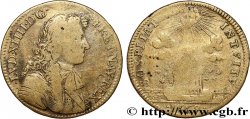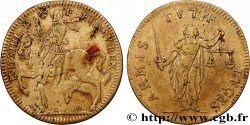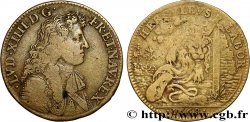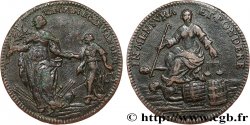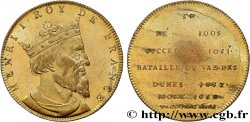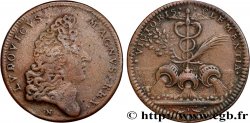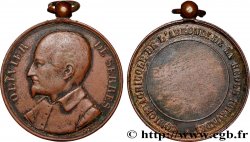v19_0968 - LOUIS XIV LE GRAND ou LE ROI SOLEIL Guy-Crescent Fagon, premier médecin du roi 1696
MONNAIES 19 (2004)
起拍价 : 380.00 €
估价 : 750.00 €
竞价记录 : 380.00 €
出价数量 : 1
最高出价 : 495.00 €
起拍价 : 380.00 €
估价 : 750.00 €
竞价记录 : 380.00 €
出价数量 : 1
最高出价 : 495.00 €
种类 Guy-Crescent Fagon, premier médecin du roi
日期: 1696
材质 silver
直径 28 mm
模子方针 6 h.
重量 7,34 g.
侧面 lisse
稀少度 R3
关于品相的说明
Usure régulière avec quelques taches noires au droit dans la patine ancienne. Très bel exemplaire, bien centré
出版目录中的项代码 :
正面
正面的文字 GVIDO. CR. FAGON. REGI. A. S. C. ARCHIAT. COMES..
正面的说明书 Buste de Guy-Crescent Fagon à gauche, avec perruque, robe et rabat.
正面的翻译 (Guido-Crescent Fagon regi a sanctioribus consiliis archiatrorum comes).
背面
背面的文字 SIC NOS SERVAVIT APOLLO. ; À L’EXERGUE EN TROIS LIGNES : M. CL. BERGER./ ITERVM DECANO/ .1696..
背面的说明书 Abeilles sortant d'une ruche.
背面的翻译 (C'est ainsi qu'Apollon nous a protégés).
评论
Jeton de Claude Berger qui glorifie Fagon, l’un de ses parents. C’est le seul jeton de la série décanale qui représente un personnage autre qu’un doyen.
Guy-Crescent Fagon est né à Paris en 1638 et, devenu orphelin, est élevé par son parrain, le fameux Gui de La Brosse, médecin de Louis XIII. Dans ses études de médecine, il s’intéresse à la circulation sanguine. Il est docteur en 1664 et deviendra en 1686 médecin de l’Hôtel-Dieu. Intéressé par la botanique, il en est aussi professeur est appelé en 1668 pour être médecin de la Dauphine. Il devient ensuite médecin de la reine et s’oppose à d’Aquin. En 1693, il devient premier médecin du roi ou archiatre, chef des dix-huit médecins du roi et des chirurgiens, apothicaires, etc. Il est nommé surintendant du jardins du roi en 1699 et entre à l’Académie des sciences la même année. il continuera ses fonctions jusqu’à la mort de Louis XIV.
Token of Claude Berger that glorifies Fagon, one of his relatives. It is the only token in the decanal series that represents a person other than a dean. Guy-Crescent Fagon was born in Paris in 1638 and, orphaned, was raised by his godfather, the famous Gui de La Brosse, physician to Louis XIII. During his medical studies, he was interested in blood circulation. He received his doctorate in 1664 and in 1686 became physician at the Hôtel-Dieu. Interested in botany, he was also a professor and was called in 1668 to be physician to the Dauphine. He then became physician to the queen and opposed d'Aquin. In 1693, he became first physician to the king or archiatrist, head of the king's eighteen physicians and surgeons, apothecaries, etc. He was appointed superintendent of the king's gardens in 1699 and entered the Academy of Sciences the same year. He continued in this role until the death of Louis XIV.
Guy-Crescent Fagon est né à Paris en 1638 et, devenu orphelin, est élevé par son parrain, le fameux Gui de La Brosse, médecin de Louis XIII. Dans ses études de médecine, il s’intéresse à la circulation sanguine. Il est docteur en 1664 et deviendra en 1686 médecin de l’Hôtel-Dieu. Intéressé par la botanique, il en est aussi professeur est appelé en 1668 pour être médecin de la Dauphine. Il devient ensuite médecin de la reine et s’oppose à d’Aquin. En 1693, il devient premier médecin du roi ou archiatre, chef des dix-huit médecins du roi et des chirurgiens, apothicaires, etc. Il est nommé surintendant du jardins du roi en 1699 et entre à l’Académie des sciences la même année. il continuera ses fonctions jusqu’à la mort de Louis XIV.
Token of Claude Berger that glorifies Fagon, one of his relatives. It is the only token in the decanal series that represents a person other than a dean. Guy-Crescent Fagon was born in Paris in 1638 and, orphaned, was raised by his godfather, the famous Gui de La Brosse, physician to Louis XIII. During his medical studies, he was interested in blood circulation. He received his doctorate in 1664 and in 1686 became physician at the Hôtel-Dieu. Interested in botany, he was also a professor and was called in 1668 to be physician to the Dauphine. He then became physician to the queen and opposed d'Aquin. In 1693, he became first physician to the king or archiatrist, head of the king's eighteen physicians and surgeons, apothecaries, etc. He was appointed superintendent of the king's gardens in 1699 and entered the Academy of Sciences the same year. He continued in this role until the death of Louis XIV.








 对产品描述纠错
对产品描述纠错 打印
打印 分享我的选择
分享我的选择 提问
提问 Consign / sell
Consign / sell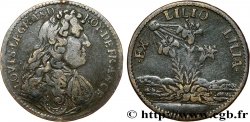
 产品介绍
产品介绍